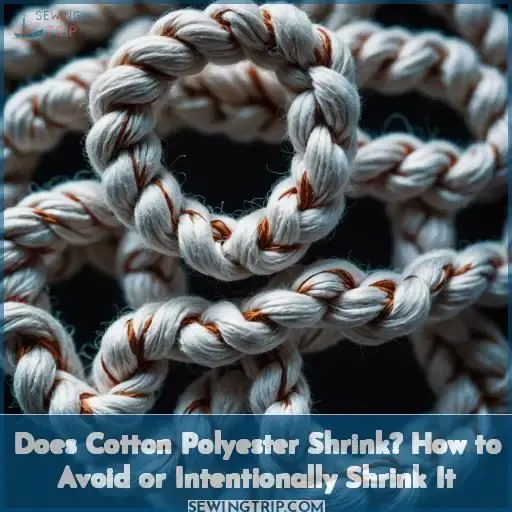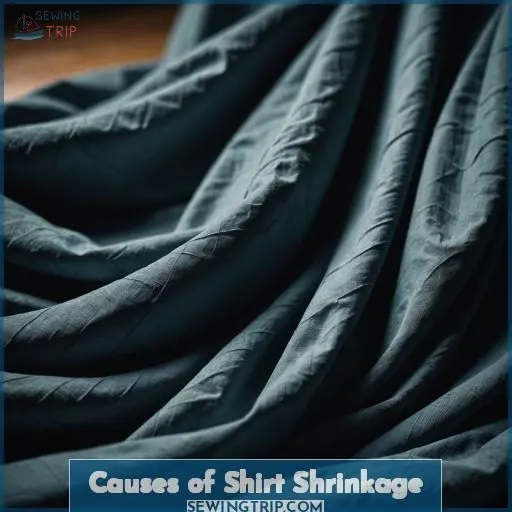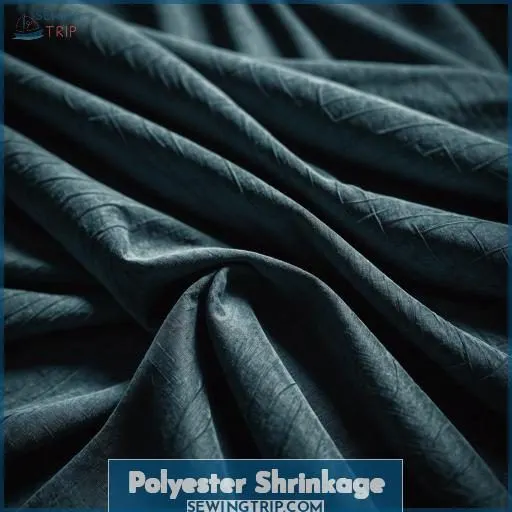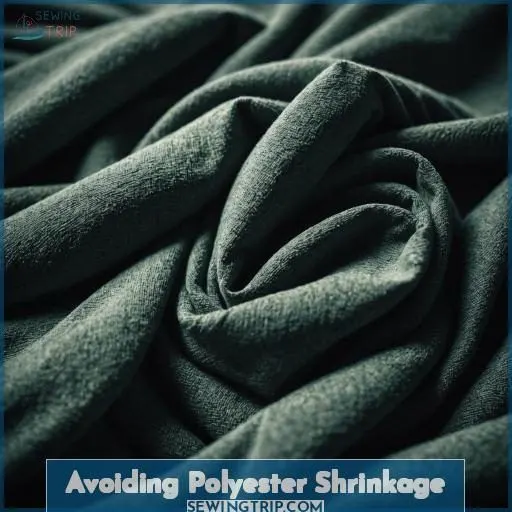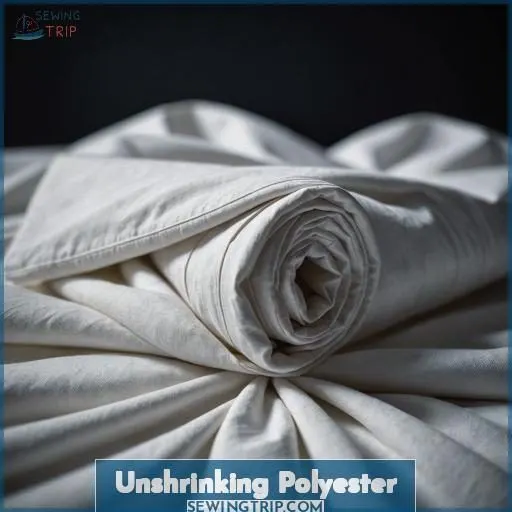This site is supported by our readers. We may earn a commission, at no cost to you, if you purchase through links.
Yes, cotton-polyester blends can shrink substantially if not handled appropriately.
The cotton fibers are predisposed to shrinking when subjected to heat and moisture, leading the fabric to constrict and deform.
To mitigate shrinkage, wash these blends in cold water and avoid high heat drying.
If pre-washed, shrinkage is less probable, but opting for a larger size is still advisable.
Don’t neglect fabric softener either – it loosens fibers, restraining shrinkage.
For a more thorough understanding of controlling and reversing shrinkage in cotton-polyester, explore the extensive guide below.
Table Of Contents
- Key Takeaways
- Does Cotton Polyester Shrink?
- Causes of Shirt Shrinkage
- Preventing Shirt Shrinkage
- Stretching Shrunk Sleeves
- Buying Shirts for Shrinkage
- Polyester Shrinkage
- Polyester Blends and Shrinkage
- Avoiding Polyester Shrinkage
- Shrinking Polyester Intentionally
- Unshrinking Polyester
- Shrinkage Phenomenon
- Frequently Asked Questions (FAQs)
- Conclusion
Key Takeaways
- Cotton-polyester blends can shrink if not handled properly, with cotton fibers being prone to shrinkage when exposed to heat and moisture.
- To prevent shrinkage, wash these blends in cold water, avoid high-heat drying, and use fabric softener to loosen fibers.
- Pre-washing and buying larger sizes can also help minimize shrinkage.
- Cotton-polyester blends can shrink due to factors like warm water washes, temperature changes, and machine drying, but these issues can be mitigated with proper washing and drying techniques.
Does Cotton Polyester Shrink?
Yes, cotton polyester blends can shrink, although they shrink less than 100% cotton due to the synthetic properties of polyester.
The amount of shrinkage will depend on the specific fabric blend and how it’s washed and dried.
To minimize shrinkage, follow the care label instructions.
These may recommend washing in cold water and tumble drying on low heat or hanging to dry.
Higher heat settings on the dryer will cause more shrinkage.
Some cotton/polyester blends may be pre-shrunk, so check the care label to see if this is the case.
Causes of Shirt Shrinkage
You’re right to be concerned about shirt shrinkage. Cotton-poly blend shirts can shrink due to factors like warm water washes, temperature changes, and machine drying. But don’t worry – with the right washing and drying techniques, you can easily prevent that unwanted shrinkage.
Shrinkage Causes
Shirt Shrinkage Causes
Shirt shrinkage can be a frustrating experience, but understanding the causes can help you prevent it. Here are some key factors that contribute to shirt shrinkage:
- Fabric composition: Cotton-polyester blends can shrink, especially if the blend isn’t pre-shrunk. Spandex or stretchy fabrics also tend to shrink more than others.
- Washing methods: Warm water washes can cause shrinkage, as can high heat drying. Avoiding these methods can help minimize shrinkage.
- Temperature changes: Rapid changes in temperature, like moving a shirt from a hot dryer to a cold room, can cause shrinkage.
- Machine drying: Using high heat settings in the dryer can substantially increase shrinkage. Opt for low-heat settings or air drying instead.
To prevent shrinkage, consider the following solutions:
- Hand-wash and hang dry: Hand-washing and air drying can help maintain the original size and shape of your shirts.
- Cold water washing: Use cold water for washing to minimize shrinkage.
- Avoid temperature changes: Try to avoid rapid changes in temperature during washing and drying.
- Choose larger sizes: Buying shirts with larger sizes can help anticipate shrinkage.
- Buy pre-shrunk shirts: Many manufacturers offer pre-shrunk shirts that are designed to minimize shrinkage.
Preventing Shrinkage
To prevent shirt shrinkage, focus on fabric care and washing methods. Use cold water for washing, and avoid temperature changes during the process. Hand-wash and hang dry shirts whenever possible.
Opt for larger sizes when buying shirts, as they’ll shrink. Consider purchasing pre-shrunk shirts to minimize shrinkage.
For polyester, wash in cold or lukewarm water and air dry or use a low-heat dryer setting. Always check care labels for specific instructions.
Stretching Shrunk Sleeves
Having mastered shrinkage prevention, let’s delve into expanding diminished sleeves. If your cotton polyester amalgamation has shrunk, fear not! Implement stretching techniques such as carefully tugging from head to cuff, employing steam application for fabric relaxation, or even utilizing a chest expander for fiber manipulation.
These methods strive to restore the sleeves, ensuring your polyester fabric regains its original splendor effortlessly.
Preventing Shirt Shrinkage
To prevent shirt shrinkage, hand-wash and hang-dry your cotton-polyester blends. Use cold water for washing, and avoid temperature changes during the washing process.
Choose larger sizes to anticipate shrinkage, or buy pre-shrunk shirts. Use fabric softener to help relax fibers and reduce shrinkage.
Always follow care labels, and air dry or use a low-heat setting in the dryer. Machine drying increases shrinkage, so avoid it if possible.
Stretching Shrunk Sleeves
If you’ve got shrunken sleeves on your cotton-polyester blend shirts, don’t fret! There are ways to restore cuff elasticity and enlarge shirt width.
Start by gently pulling the sleeves with moderate pressure from the head and cuff. Repeat this several times to stretch them out.
You can also try using a chest spring exercise to help stretch the sleeves, or steam them to make them more pliable.
If the fabric is still too tight, you might need to use a fabric softener to help relax the fibers.
Buying Shirts for Shrinkage
When buying shirts, it’s important to account for shrinkage to achieve a perfect fit. Here are some tips for purchasing shirts with shrinkage in mind:
- Choose larger sizes: If you expect the shirt to shrink, buying a larger size can help maintain the intended fit.
- Consider collar and sleeve length: Select sizes that accommodate shrinkage in both the collar and sleeves.
- Opt for a slightly larger collar: If you prefer a longer sleeve, try purchasing a shirt with a collar that’s 1/2 size larger than your usual preference.
- Review manufacturer’s sizing and shrinkage guidelines: Different brands may have varying shrinkage rates, so it’s essential to consult the manufacturer’s sizing information.
- Stay with a manufacturer that produces shirts that fit well after shrinkage: If you find a brand whose shirts fit you well after shrinkage, consider sticking with them for future purchases.
Polyester Shrinkage
Polyester is a synthetic fabric that resists shrinkage. However, it can still shrink if not washed and dried properly. High heat (230°F or 110°C) causes shrinkage. Cold water and air drying prevent shrinkage.
Polyester blends with cotton, rayon, or spandex may shrink more. 100% polyester is more resistant to shrinkage than blends.
To prevent shrinkage, wash polyester in cold or lukewarm water (below 230°F or 110°C), air dry, avoid hot water or high-heat dryer settings, and check care labels for specific instructions. Pre-wash polyester fabric before sewing to prevent shrinkage.
If you want to shrink polyester intentionally, wash on high heat and tumble dry on high heat. To unshrink polyester, soak in a conditioner or baby shampoo solution, stretch gently while wet, roll in absorbent towel, lay flat, and let dry flat with weights or safety pins.
High heat dryer and white vinegar can help with shrinkage control in poly/cotton blends.
Polyester Blends and Shrinkage
Just like a mixed bag of nuts, polyester blends come with their own set of quirks. Your cozy poly-cotton blend might shrink less than pure cotton, but it’s not immune to a high-temperature tango. Remember, the polyester blend properties dictate the dance of shrinkage.
A 50% cotton 50% polyester tee might handle the heat better than a full cotton counterpart, but it still has a tendency to tighten up.
With regard to polyester blend care, think of it as a delicate balance.
Avoiding Polyester Shrinkage
To avoid shrinkage in polyester, follow these tips:
- Choose the right fabric blend: Opt for polyester-cotton blends with a higher percentage of polyester to reduce shrinkage.
- Pre-wash fabric: Wash the fabric before sewing to prevent shrinkage.
- Check care labels: Follow the manufacturer’s instructions for washing and drying your polyester garments.
- Avoid high heat: Wash in cold or lukewarm water and air dry or use low heat in the dryer.
- Use anti-shrinkage agents: Some finishing processes can make fibers more stable and resistant to shrinkage.
- Maintain proper care: Wash and dry your polyester garments according to the manufacturer’s instructions to minimize shrinkage.
Shrinking Polyester Intentionally
If you’re looking to intentionally shrink your polyester shirts, there are a few methods you can use. First, hand wash your shirt in cold water and avoid using a dryer. Instead, air dry your shirt to prevent any unwanted shrinkage. If you want to speed up the process, you can pre-shrink your polyester shirts by washing them in cold water and then drying them on a low heat setting. This will help to reduce the amount of shrinkage that occurs during the washing and drying process.
Another option is to use a hot water wash and high heat dryer setting. This will cause your polyester shirt to shrink more than if you were to use cold water and air dry. However, be aware that this method may damage the fabric if not done carefully.
If you’re looking to shrink a polyester shirt for a specific purpose, such as to fit better or to match a particular size, it’s important to bear in mind that the amount of shrinkage you can achieve will be limited. Polyester is a synthetic fiber that’s resistant to shrinkage, so you may not be able to achieve significant size reduction through intentional shrinking.
Unshrinking Polyester
When cotton polyester shirts shrink, you can restore their shape using various methods.
First, soak the fabric in a conditioner or baby shampoo solution.
Then, gently stretch the fabric while it is still wet.
Roll it in an absorbent towel to remove excess water.
Lay it flat to stretch back to its original size.
Let it dry flat with weights or safety pins to hold the shape.
Shrinkage Phenomenon
Shrinkage is an inherent part of fabric life, but grasping the reasons behind it can help you prevent or even induce it intentionally. Here are three essential factors to ponder:
- Fabric Characteristics: Different fabrics have varying responses to heat and water. Cotton contracts because of humidity and heat exposure, while polyester withstands shrinkage. Combining cotton and polyester can mitigate shrinkage compared to unadulterated cotton.
- Shrinkage Control: Laundering fabrics beforehand, utilizing cold or lukewarm water for washing, and abstaining from hot water or high-heat dryer settings can help minimize shrinkage. Garment care label guidelines are imperative for appropriate care.
- Garment Distortion: Non-uniform shrinkage can distort garment shape, resulting in shorter sleeves, pant legs, and waistbands. Prewashing fabrics and employing a hot rinse can aid in averting this. When dealing with linen, ensure it has been preshrunk. For polyester, use conditioner or baby shampoo solutions to assist in softening fibers and gently stretching sleeves while damp.
Frequently Asked Questions (FAQs)
How does humidity affect cotton-polyester blend shrinkage?
Humidity can cause cotton-polyester blends to swell and shrink. The cotton fibers absorb moisture, causing them to expand, while polyester resists shrinking. To avoid this issue, you’ll want to control humidity levels when washing and storing these garments.
Can ironing reverse shrinkage in cotton-polyester fabrics?
Ironing won’t unshrink cotton-polyester blends, sadly. The fibers’ molecular bonds tighten during shrinkage, making it extremely tough to reverse. Your best bet? Avoid shrinking them in the first place by washing in cold water and air drying. Take care with these fabrics, my friend!
Does the color of the fabric influence shrinkage rates?
Ponder this: while color itself doesn’t directly impact shrinkage, the dye process can affect fibers’ integrity. You’ll find that vibrant hues may shrink more than subdued shades due to dye’s strain on the threads’ resilience. But fret not, proper care will keep your favorite tees in tip-top shape!
How does repeated washing impact long-term fabric shrinkage?
Repeated washing gradually increases fabric shrinkage over time. You’ll notice it most with cotton-heavy blends–the fibers tighten and compress with each wash/dry cycle. Proper care like cold water and low heat can slow this process notably.
Are there eco-friendly methods to prevent fabric shrinkage?
You can prevent fabric shrinkage eco-friendly by air drying clothes, using cold water washes, and pre-shrinking fabrics before sewing. Avoid harsh chemicals – go natural with vinegar rinses or hair conditioner fabric softeners.
Conclusion
Prioritizing proper precautions prevents prospective predicaments with cotton-polyester shrinkage. Diligently following fabric care instructions, leveraging lower temperatures, and employing purposeful preshrinking practices are paramount. Ultimately, understanding how cotton-polyester blends interact with heat and moisture grants the ability to masterfully manage shrinkage, ensuring a comfortable, conforming fit.

